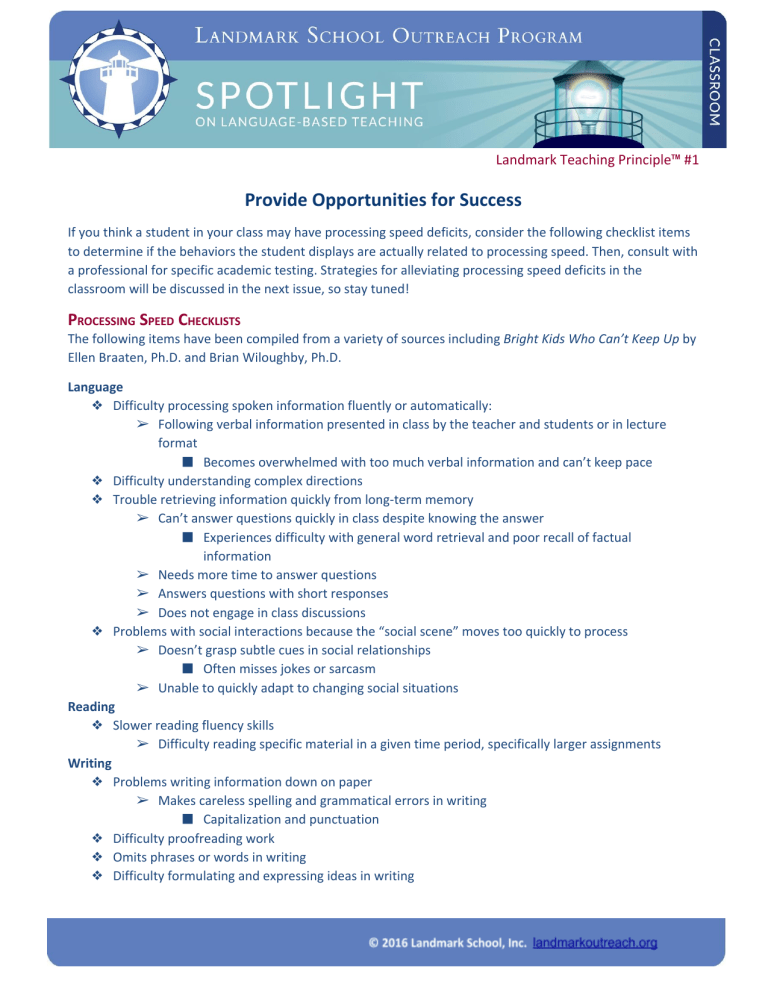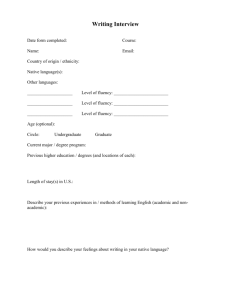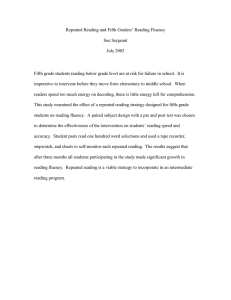
Landmark Teaching Principle™ #1 Provide Opportunities for Success If you think a student in your class may have processing speed deficits, consider the following checklist items to determine if the behaviors the student displays are actually related to processing speed. Then, consult with a professional for specific academic testing. Strategies for alleviating processing speed deficits in the classroom will be discussed in the next issue, so stay tuned! PROCESSING SPEED CHECKLISTS The following items have been compiled from a variety of sources including Bright Kids Who Can’t Keep Up by Ellen Braaten, Ph.D. and Brian Wiloughby, Ph.D. Language ❖ Difficulty processing spoken information fluently or automatically: ➢ Following verbal information presented in class by the teacher and students or in lecture format ■ Becomes overwhelmed with too much verbal information and can’t keep pace ❖ Difficulty understanding complex directions ❖ Trouble retrieving information quickly from long‐term memory ➢ Can’t answer questions quickly in class despite knowing the answer ■ Experiences difficulty with general word retrieval and poor recall of factual information ➢ Needs more time to answer questions ➢ Answers questions with short responses ➢ Does not engage in class discussions ❖ Problems with social interactions because the “social scene” moves too quickly to process ➢ Doesn’t grasp subtle cues in social relationships ■ Often misses jokes or sarcasm ➢ Unable to quickly adapt to changing social situations Reading ❖ Slower reading fluency skills ➢ Difficulty reading specific material in a given time period, specifically larger assignments Writing ❖ Problems writing information down on paper ➢ Makes careless spelling and grammatical errors in writing ■ Capitalization and punctuation ❖ Difficulty proofreading work ❖ Omits phrases or words in writing ❖ Difficulty formulating and expressing ideas in writing Phone: 978.236.3216 | Email: outreach@landmarkschool.org | PO Box 227 | 429 Hale St | Prides Crossing, MA 01965‐0227 www.landmarkoutreach.org Landmark Teaching Principle™ #1 Task Completion ❖ Trouble sustaining attention to a task, usually because information is coming too quickly ➢ Becomes easily distracted ❖ Problems finishing almost anything in the allotted amount of time ➢ Underestimates the amount of time a task will take ➢ Develops anxiety around time constraints ❖ Avoids engaging in difficult tasks ➢ Do not start tasks that they know they will be unable to finish ❖ May finish work quickly and turn it in despite it not being complete or thorough ❖ Forgets necessary materials ❖ Difficulty planning ahead Demeanor ❖ Often looks confused or absentminded ➢ Appears to not listen to others ❖ Seems tired (even after enough sleep) lazy, or unmotivated ❖ Sometimes does not stay seated ❖ Trouble with changes to routine and new situations ❖ Trouble recognizing when behaviors annoy others Cognitive Tests After reviewing information garnered from the checklist, it is important that the student be evaluated in a formal setting. Intelligence tests generally include processing speed sub‐tests and one such test is the WISC‐IV, which contains the processing speed index. It is important to note that these sub‐tests measure rate of physical ability rather than language processing. Other commonly used tests of processing speed include: ● ● ● ● ● Differential Ability Scales, Second Edition (DAS‐III): Speed of Information Processing, Rapid Naming Woodcock‐Johnson Test of Achievement, Third Edition Academic Fluency Sub‐tests (WJ‐III) Weschler Individual Achievement Test (WIAT‐III): Math Fluency, Reading Fluency Trail Making Tests and Grooved Pegboard Tests Stroop Tests HOW IS THIS PROVIDING OPPORTUNITIES FOR SUCCESS? The more knowledgeable the classroom teacher is about processing speed deficits and recognizing those signs in students, the better the teacher can prepare the classroom environment, instruction, and materials. This understanding will allow students to be taught at an appropriate pace and level without overburdening their processing speed, which will ultimately allow students to be successful within the classroom. Phone: 978.236.3216 | Email: outreach@landmarkschool.org | PO Box 227 | 429 Hale St | Prides Crossing, MA 01965‐0227 www.landmarkoutreach.org

